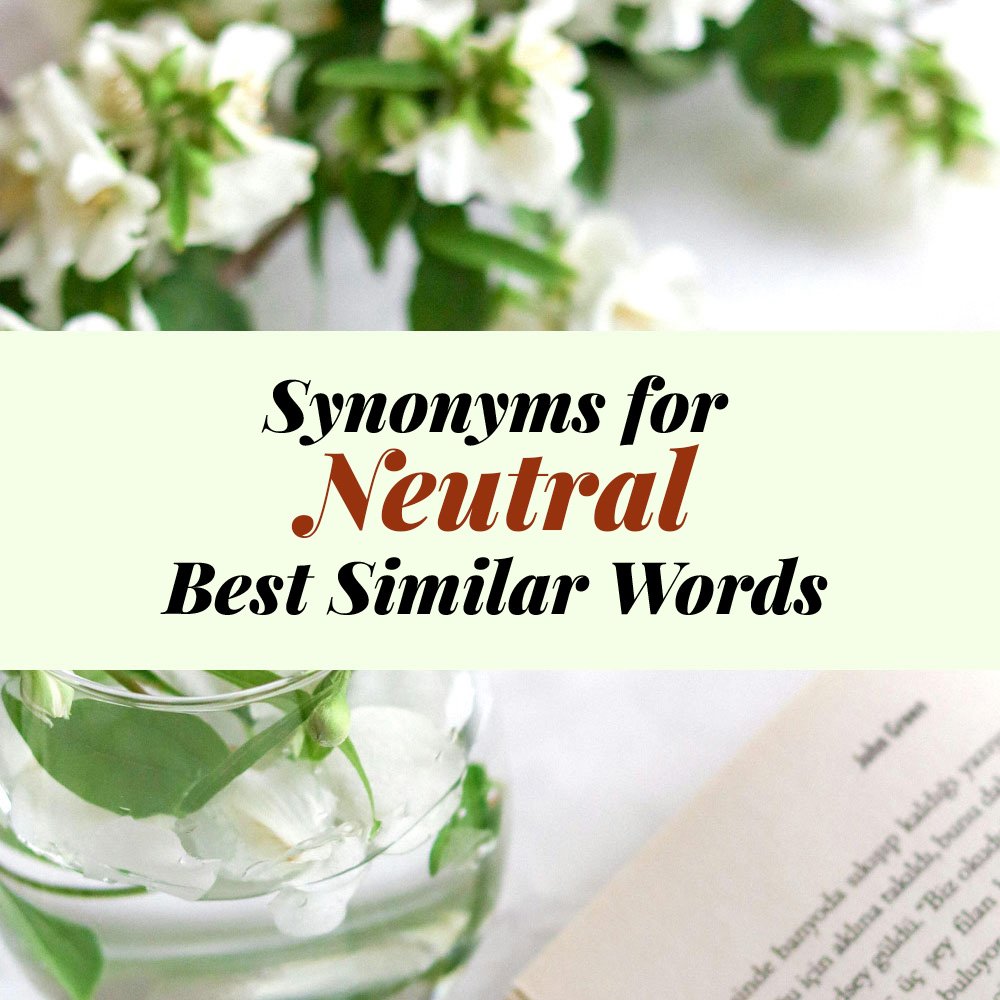Finding the right word to describe someone or something as neutral can make your writing stronger. Words like impartial, unbiased, and balanced can fit different situations. In this article, we will explore 19 other ways to say neutral with examples, so you can use the perfect synonym every time.
| Synonym | Example |
|---|---|
| Impartial | The judge remained impartial during the trial. |
| Unbiased | Her report was unbiased and fair to both sides. |
| Balanced | The article presented a balanced view of the issue. |
| Objective | The scientist gave an objective explanation of the results. |
| Nonpartisan | The committee is nonpartisan and welcomes all opinions. |
| Detached | He stayed detached and did not take sides. |
| Fair-minded | She is fair-minded and treats everyone equally. |
| Even-handed | The teacher gave even-handed feedback to all students. |
| Moderate | His opinions were moderate and avoided extremes. |
| Indifferent | He was indifferent to the arguments of both teams. |
| Disinterested | She remained disinterested in the dispute. |
| Unprejudiced | The organization has unprejudiced policies. |
| Neutral-minded | The politician stayed neutral-minded during debates. |
| Nonaligned | The country remained nonaligned in world conflicts. |
| Equitable | They made an equitable decision for all parties. |
| Uninvolved | He was uninvolved and observed quietly. |
| Apathetic | She felt apathetic about both options. |
| Unemotional | The referee stayed unemotional throughout the game. |
| Impersonal | His comments were impersonal and professional. |
19 Different Ways to Say NEUTRAL: Another Word for Neutral
Impartial
Being impartial means not favoring one side over another. It is a strong word to show fairness and honesty. You can use it when talking about judges, referees, or any situation where fairness is important. It works well when you want people to trust your opinion or decision. Using impartial shows you are open and do not take sides.
- The referee remained impartial throughout the match.
- She gave an impartial review of the project.
- The teacher stayed impartial when grading.
- He offered impartial advice to both friends.
Unbiased
Unbiased is perfect when describing information or people who do not favor any side. This word is often used in reporting, research, and discussions. Choosing unbiased makes your description reliable because it shows fairness. Use it when you want to stress honesty and accuracy. It is a safe choice for professional or formal contexts.
- The article was unbiased and informative.
- He gave an unbiased opinion on the matter.
- The report remained unbiased and factual.
- She tried to stay unbiased during the debate.
Balanced
The word balanced works when something is fair and considers all sides. It can describe opinions, views, or actions. Balanced suggests harmony and equality between options or sides. It is great when you want to show moderation or fairness in judgment. Using this word makes your message clear and respectful.
- The teacher provided balanced feedback.
- The discussion had balanced viewpoints.
- He wrote a balanced article for the magazine.
- The team presented a balanced argument.
Objective
Being objective means focusing on facts and truth rather than personal feelings. It is ideal for science, research, or professional work. Using objective shows your thinking is logical and fair. People trust objective opinions because they are based on reality, not bias. It is also useful when you want to stay neutral in conflicts.
- The scientist gave an objective explanation.
- She maintained an objective approach to the study.
- His review was objective and thorough.
- The manager stayed objective during the evaluation.
Nonpartisan
The word nonpartisan is used for groups, organizations, or people that do not support any side. It is often connected to politics or debates. Using nonpartisan indicates fairness and independence. This word is professional and trustworthy. It can also describe decisions, committees, or reports that avoid bias.
- The committee is nonpartisan and fair.
- The meeting was nonpartisan and open to all.
- They created a nonpartisan report on the issue.
- The politician promised a nonpartisan approach.
Detached
Being detached means observing without emotional involvement. It works well when someone needs to stay calm or neutral. Using detached suggests professionalism and control. It can also show wisdom because you are not easily influenced. This word is good for describing reactions, opinions, or attitudes.
- He stayed detached during the argument.
- She was detached and did not pick a side.
- The referee remained detached during the game.
- He gave a detached analysis of the situation.
Fair-minded
A fair-minded person treats everyone equally and avoids bias. This word emphasizes honesty and morality. It is useful when describing someone who judges fairly. Using fair-minded can inspire trust and respect. It is a strong choice for personal or professional situations.
- She is fair-minded in her decisions.
- He remained fair-minded during conflicts.
- The teacher is fair-minded with all students.
- They showed a fair-minded attitude in the debate.
Even-handed
The word even-handed suggests fairness and equality in actions or decisions. It is often used to describe leaders, teachers, or managers. Using even-handed implies consistency and fairness. This word is excellent when showing fairness in judgment or treatment.
- The manager gave even-handed feedback.
- The judge handled the case even-handedly.
- She treated all employees even-handedly.
- He offered even-handed advice to everyone.
Moderate
Moderate describes opinions or behavior that avoid extremes. It is ideal when showing neutrality or balance. Using moderate shows careful judgment and thought. It is suitable for discussions, politics, or personal views. This word is helpful when you want to be respected and trusted.
- His opinions were moderate and reasonable.
- She chose a moderate approach to the problem.
- They made moderate decisions in the meeting.
- The debate included moderate perspectives.
Indifferent
Being indifferent means not favoring any side. It is useful when describing feelings, reactions, or choices. Using indifferent can show neutrality or lack of strong emotions. It is common in daily life or casual situations. This word helps express non-involvement politely.
- He was indifferent to the argument.
- She felt indifferent about the results.
- The teacher was indifferent to the complaints.
- He remained indifferent during the discussion.
Disinterested
Disinterested means not influenced by personal feelings or gains. It is often used in professional or formal contexts. Using disinterested shows honesty, trustworthiness, and neutrality. This word is perfect for judges, referees, or advisors. It emphasizes fairness and objectivity.
- She stayed disinterested in the dispute.
- The panel included disinterested experts.
- He remained disinterested during the evaluation.
- The organization hired disinterested reviewers.
Unprejudiced
Unprejudiced describes someone who does not have bias or unfair judgment. It is ideal for personal, professional, or formal settings. Using unprejudiced shows fairness and equality. This word works well when describing attitudes, policies, or decisions.
- The organization has unprejudiced rules.
- She remained unprejudiced in her judgment.
- He is known as an unprejudiced leader.
- The study provides unprejudiced results.
Neutral-minded
Being neutral-minded means keeping an unbiased mind. It is useful for discussions, debates, or decisions. Using neutral-minded shows thoughtful observation and fairness. This word can describe people, attitudes, or approaches. It helps communicate calm and open thinking.
- The politician stayed neutral-minded during debates.
- She remained neutral-minded in the argument.
- He approached the problem with a neutral-minded view.
- The group valued neutral-minded opinions.
Nonaligned
Nonaligned refers to staying independent without joining any side. It is common in politics, countries, or organizations. Using nonaligned shows neutrality and independence. It is professional and formal. This word works well for serious or international contexts.
- The country remained nonaligned in conflicts.
- The group is nonaligned and independent.
- He maintained a nonaligned stance in debates.
- The organization supported nonaligned policies.
Equitable
Equitable means fair and just for everyone. It is excellent when describing decisions, rules, or treatment. Using equitable emphasizes balance and fairness. It is formal but very strong for legal, social, or organizational contexts.
- They made an equitable decision.
- The distribution of resources was equitable.
- The company ensured equitable treatment.
- She promoted equitable policies for all.
Uninvolved
Being uninvolved shows that someone does not take part in a conflict or decision. It is casual and polite to describe neutrality. Using uninvolved helps express non-participation clearly. This word works well in personal or professional situations.
- He was uninvolved and watched quietly.
- She remained uninvolved in the argument.
- The teacher stayed uninvolved in disputes.
- They kept uninvolved in office politics.
Apathetic
Apathetic means not caring about one side or any option. It describes feelings or reactions. Using apathetic can express emotional neutrality or disinterest. It works well in casual situations when someone shows no strong opinion.
- She felt apathetic about the choices.
- He was apathetic to the debate.
- The crowd seemed apathetic during the game.
- She remained apathetic in the discussion.
Unemotional
Unemotional describes someone who does not show feelings or reactions. It is great for professional or formal contexts. Using unemotional suggests calmness, control, and neutrality. It is perfect for judges, referees, or observers.
- The referee stayed unemotional throughout the match.
- She gave an unemotional explanation.
- He remained unemotional during the discussion.
- The manager kept an unemotional approach.
Impersonal
Being impersonal means not showing feelings or personal bias. It is useful for work, professional, or formal contexts. Using impersonal emphasizes objectivity and neutrality. It works well when you want to communicate fairness without emotion.
- His comments were impersonal and professional.
- The report was impersonal but informative.
- She gave an impersonal review.
- The company maintained an impersonal approach.

Final Thoughts
Using the right synonym for neutral can make communication stronger and more precise. Words like impartial, unbiased, and balanced fit different contexts perfectly. Pick the word that matches your situation to convey fairness, objectivity, or independence effectively.









